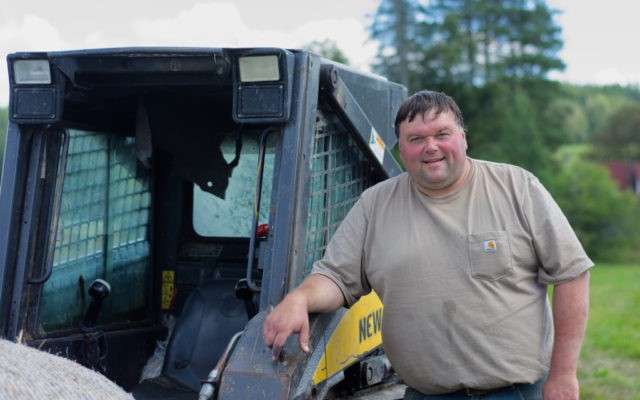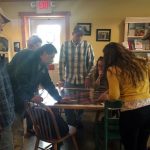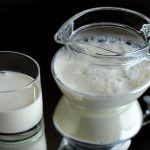
Drew, 47, is facing one of his toughest seasons due to drought conditions since he took over the family farm when he was 20. With 200 head of cattle, he estimates that he would need 1,900 large round bales of hay in order to get through winter without thinning the herd. Drew said on Sept. 1 that he was able to harvest roughly 650 bales on the more than 120-year-old farm.
Hearing of the situation, Drew’s longtime friends Ellen Cleaves and her husband Malcolm Hare came up with the idea of donating hay to his farm. Hare, who has numerous hay connections with farmers, secured a truckload of hay that would cost $1,000 to transport from Dexter to Drew’s Woodland farm, Cleaves said.
Cleaves then contacted Dan Robertson, another longtime friend of Drew’s, and his wife Tamra Robertson, to see if they could find another 14 people to each commit $50 for the load.
The group did not reveal their plan to Drew, but Dan Robertson posted the fundraiser on his Facebook page, and it received an overwhelming response from the community.
Meanwhile, Hare kept looking for more hay. And while he was able to secure some from farmers in Limestone, Ashland and throughout The County, he said many farmers did not have hay to sell because of this year’s drought conditions.
Hare said local farmer Ryan Guerrette offered to deliver two loads with 22 bales each from Limestone farmer Wayne Mazerolle free of charge.
Robertson said he’s known Drew since moving to the area in 1986, and that Drew’s involvement in the fundraiser for Robertson’s daughter, Emily Dyer, who suffered a heart attack on June 6 and was in need of a heart transplant, motivated him to help Drew.
As of Aug. 31, Robertson said 109 individuals and families had made donations, raising roughly $9,000 over the course of just two weeks. He said the smallest donation was around $25, the largest was an anonymous donation of $850, and that it was not uncommon to see single donations of $200 or $300.
Although Robertson said he had been questioning Drew for a week about his needs, Drew said he didn’t know anything about the donation until the day the first load of hay arrived in late August.
“They all kept it pretty quiet on purpose because I assume they thought I’d probably squelch that — and I would have. So they were pretty tricky,” Drew said.
By Sept. 1, roughly 100 large round bales of hay had been delivered, and more were on the way, Drew said.
“Tommy knows he’s going to have to thin his herd down, but every 10 bales we give him is one less cow he has to thin out,” Robertson said.
Drew said drought conditions this year have been particularly rough on farmers throughout the state and in many parts of the country.
“Most places are getting 25 percent of last year’s yield,” said Drew. “Fifty percent would be pretty good for this year. I’m not sure we can still get to where we need to be, but we’re in a lot better shape today than when they first asked me.”
He said he was amazed that his friends were able to find such a large amount of hay.
“A lot of people are in the same boat and I don’t know who is going to save them. I have a bit of survivor’s guilt going on with the reality of it all. We’ve never looked at the forecast and saw 10 sunny days in a row with no rain and felt bad about it. Now, when you look at the forecast you feel bad about the good weather. That’s the kind of year we’ve had,” Drew said.
“This summer has been so sad for people between the pandemic and the drought,” Cleaves said. “Our intent was just to say ‘You’re an important person, and we care.’ Even if it wasn’t going to fix the problem, it would give him hope.”
Drew took over H.B. Farms, a dairy farm on the Woodland Center Road, in the early 1990s. The farm has been in his family since 1974 and was named after Helen and Blanche Farrington, who owned the farm since 1896 and adopted Drew’s grandfather Hannibal, an orphan. Hannibal took care of the two sisters in their later years and they eventually sold him the farm for a dollar.
The farm was passed down to Drew’s mother, Ida, who lives on the farm with Drew. His father, Dana, died in a vehicle crash.
























